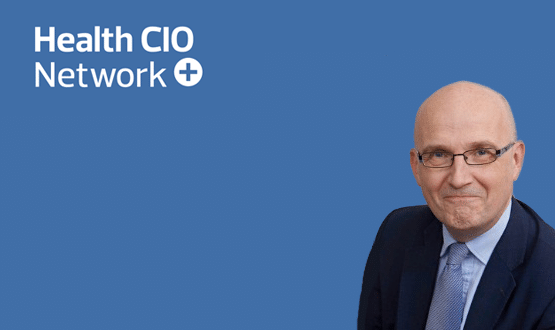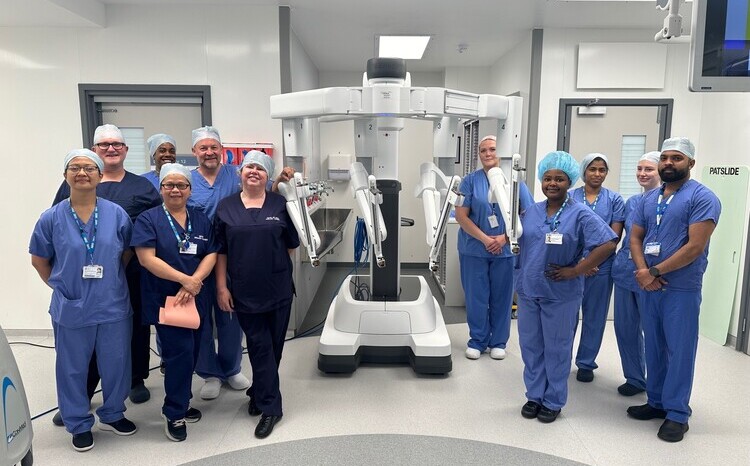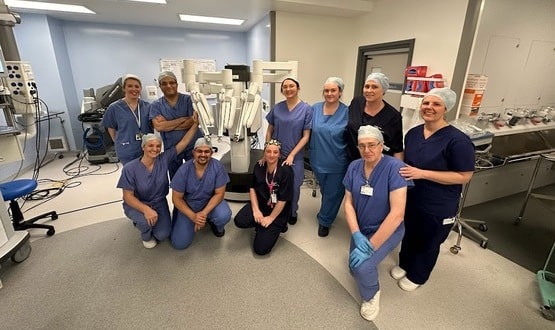The CIO interview: Andy Vernon, Sheffield Teaching Hospitals NHS Foundation Trust
- 26 March 2018

Andy Vernon, chief information officer at Sheffield Teaching Hospitals NHS Foundation Trust, believes the focus on large-scale solutions like electronic patient records could hinder other innovations in healthcare. He also warns of the dangers of ‘digital tail-wagging’ and tells us why he’d travel back in time to meet a bongo-playing Nobel Prize winner.
What did you do before becoming an NHS CIO?
I’d had a very long career in digitally-enabled change before becoming an NHS CIO last year. My most recent role before coming in to the NHS full-time was as a partner for a major technology and transformation consultancy.
I worked for a couple of decades leading strategy and transformation work at senior levels, not just across the NHS, but also in central and local government as well as the private sector and overseas.
When did your interest in IT begin?
I cut my IT teeth in my teens on single board computers and trying to convince a Sinclair ZX81 to do things it wasn’t designed to do with 1K of RAM. My interest in computing was spurred on by my interests in two seemingly unrelated – but actually connected – fields: church bell ringing and theoretical physics.
Within your organisation, what is the most significant digital achievement of the past 12 months?
We’ve achieved a huge amount in a very complex environment, but I think the biggest achievement in the last 12 months has been to develop a really robust digital strategy that had lots of input from both the market and our clinicians and non-clinicians.
The fact that I still believe the underpinnings of that strategy are and will remain valid, in what is a very dynamic environment, is a real testament to the work our team put into it.
What will be the most significant development in healthcare over the next 12 months?
Undoubtedly the need to share and collaborate across boundaries and, in particular, across health and social care. This has been an ambition for as long as I can remember, but I think we’re at a real tipping point now.
The service-led discussions I’m seeing in South Yorkshire are really making progress and certainly from a digital perspective I sense a culture of real collaboration is there to help us deliver.
What’s the biggest barrier to being a more effective CIO?
Having enough time to think! But I think the solution is within our control and lies in creating the right environment, and unlocking the power of the huge technology talent that there is within the NHS.
This naturally creates the space, but it is about building and trusting our team and adopting a leadership rather than management style.
What’s the biggest barrier the NHS faces overall in achieving digital transformation?
I think most people would say funding would be near the top of their list – specifically for me, it’s the nature of that funding: capital investment doesn’t match today’s subscription-based approaches to delivering technology. We need a hard look at this nationally.
Beyond that, I think we need to be much more needs-led as digital professionals. I do worry a lot about the digital tail-wagging of the service dog and I think we sometimes still treat digital as the answer to all ills. I really feel we still have a way to go to avoid ‘digital push’ rather than ‘service pull’.
I know that might set me out as being slightly heretical but, 35 years into my digital career, I’ve seen too many instances of digital over-promising and under-delivering. In particular, our suppliers have a massive journey to go on.
If you had one piece of advice for other NHS CIOs, what would it be?
Give your team the space to do what they are good at – listen, encourage, support and provide the top cover to let them flourish. And spend the time to listen to your customers at all levels – especially patients.
Who in the NHS do you admire the most and why?
A really tricky question to answer. I don’t know anyone I don’t admire anyone in the NHS for their dedication and expertise at a really difficult time for the service.
The people I really admire, though, tend to be those who are largely invisible, but who make the NHS run and actually make a difference for patients that we don’t always properly recognise. These include medical records teams (even in a digital world), switchboard, cleaners, porters and so on – without them, the NHS wouldn’t be able to function.
If you were given £30 million to spend on digital transformation within your trust, where would that money go?
£30 million could go a very long way – especially if it was largely revenue rather than capital investment. I would spend a large proportion of it on doing all the things we need to do to make us properly mobile – kit, networks, security and so on.
I’d want to use some of it to make sure that we had a sustainable approach, with the ability to make us agile and responsive to the trust’s and wider system’s mobile needs. This means investing in our team and their capability.
I’d also aim to make the £30m go a long way – up to five years out. I certainly wouldn’t want to spend on a large white elephant piece of IT.
What is the most over-hyped digital innovation in health?
Having been on a journey with this through our test bed work for NHS England, I’m a bit sceptical about the value of many patient apps. Our experience of trying to get the best of the market in this area has shown that many promise a lot but deliver limited value in the real world for the people who need them most.
That’s not to say they are not a component of the wider solution, but I’ve yet to see the real value delivered.
What is the most under-rated digital innovation in health?
The focus on EPRs and large-scale solutions may obscure a number of other innovations. For me, real innovation will come from combinations of technologies rather than single solutions.
I expect us to move very rapidly to a world where voice recognition and other technologies do much more for clinicians and non-clinicians. We’re not quite there yet, but there are some really interesting digital dictation technologies with AI back-ends that enable clinical decision support in real time.
What technologies could have the biggest impact on relieving winter pressures on the NHS?
Anything that improves real-time communications and keeps a single version of the truth available makes a massive difference.
Communications and collaboration technologies of all sorts were one of the biggest ‘asks’ when we did our strategy work. Winter pressures have really brought that into focus with the ability to coordinate staff, patients and resources in real time being fundamental.
As an example, March’s horrendous weather conditions meant that things like coordinating volunteers with 4x4s to help people get around became essential. Technology could play much more of a role.
What’s the worst job you’ve ever had and why?
Inventorising ball bearings in the stores at a pre-stressed concrete works when I was 16. It was ultimately great life experience as the environment was really rough and ready. That and labelling locations of manhole covers on maps for the district engineers at our local council as a summer job.
Both were mind-numbing, but allegedly precursors to eventual computerisation.
If you could travel back in time to meet one person, who would it be?
Without a doubt it would be Richard Feynman, the Nobel Prize-winning physicist and sometime bongo drum player.
He was one of the greatest thinkers, teachers and communicators who ever lived. My college tutor who went to work with him at Caltech in the ’80s said that if Feynman said he didn’t understand something, it was usually wrong – but that it would take a few weeks to work out why.
What’s the last song you listened to? (Be honest!)
According to Spotify it was “Born To Lose” by Motörhead. But I do have quite eclectic tastes!
What’s your favourite piece of technology at home and why?
Spotify combined with whatever I play it through, as I have a follow-my-nose approach to finding new things to listen to. That and my ancient turntable and the LPs I bought in large numbers in the ’80s.
If you could have any other job, what would it be?
Anything would have to involve people and making a real difference. I’ve always wanted to do more in the third sector than I get time for today. I’ve also toyed with the idea of doing academic research from time to time, although there would have to be a really big teaching element.
In a film of your life, who would play you?
Pass – I’m not sure my life would be interesting enough for more than a five-minute short!





1 Comments
Great interview. Lots of key items to agree with. A digital health Transformation does not have to cost a fortune. Revenue budgets are required to match the trends in SaaS delivered solutions. and a patient first focus will get the support from a wider pool of resources / team to get projects successfully implemented.
Noel.
Comments are closed.